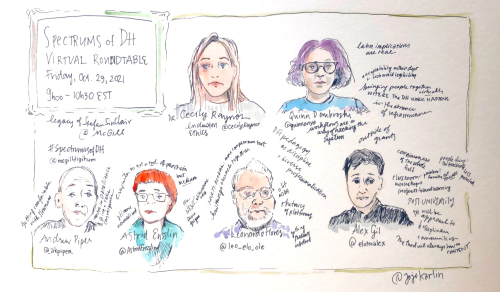On Friday, October 29, 2021, the final event in the Spectrums of DH virtual lecture series (2020-2021) took place in honour of Professor Stéfan Sinclair's legacy of DH initiatives. McGill Digital Humanities and UdeM's CRIHN (Centre de recherche interuniversitaire sur les humanités numériques) hosted a reunion of the Spectrums of DH speakers for a virtual roundtable discussion moderated by Professor Cecily Raynor.
Digital humanists from all over the world tuned into the roundtable via Zoom to hear the participants discuss the state of Digital Humanities across a range of topics. See below for questions and their timestamps to quickly locate the discussion in the recording.

The Spectrums of DH Roundtable Participants
Quinn Dombrowski is the Academic Technology Specialist at Stanford University within the Library and in the Division of Languages, Cultures and Literatures (DLCL).
Leonardo Flores is Chair of the English Department at Appalachian State University and President of the Electronic Literature Organization.
Andrew Piper is Professor and William Dawson Scholar in the Department of Languages, Literatures, and Cultures at McGill University. He directs .txtlab, a laboratory for cultural analytics at McGill, and is editor of the Journal of Cultural Analytics.
Astrid Ensslin is Associate Professor in Digital Culture in the Department of Linguistic, Literary & Aesthetic Studies at University of Bergen in Norway.
Alex Gil is a Digital Scholarship Librarian at Columbia University Libraries. He is also founder and former chair of Global Outlook::Digital Humanities
Moderator: Cecily Raynor is an Associate Professor of Contemporary Latin American Cultural Production and Digital Humanities at McGill University. She is currently the Graduate Program Director for Digital Humanities at McGill as of the 2020-2021 academic year.
Roundtable Topics & Questions
DH project management (04:15)
On October 3, Professor Andrew Piper Tweeted "ten years in and just getting the hang of efficiently creating research teams and effective workflows...Add to the list of "things they don't teach you in grad school." Could you please elaborate on some of these effective workflows as they pertain to DH project management?
DH and e-literature (13:35)
Concerning digital fiction, can you speak specifically to how digital methods (feel free to enumerate these as you wish) have shaped your research agenda? Furthermore, how can we continue to strive towards validating e-lit as DH? What is the value in that undertaking?
DH pedagogy for career prep (24:27)
As universities have started to do away with the tenure process, and buzzwords like “alt-ac” are gaining traction among career academics, curriculum and degree design has taken a turn toward prioritizing job placement for graduates. Given the increasing shift toward a digitally-inflected educational and job sector, how do you envision Digital Humanities pedagogy as a discipline or as a methodology in higher education classrooms? How can students in a DH program position themselves towards increasingly diverse professionalization?
Multilingual DH (36:18)
When entering into research that involves other language territories, how do you address the significant labor footprint of building, annotating, and housing corpora in non-English contexts? How do we incorporate multi-lingual analysis into the very backbone of DH intro courses or even E-literature curricula given our embedded reliance upon English?
The future of DH (49:38)
It’s an understatement to say that DH has come a long way since the millennium, and so much has changed during the pandemic including the adaptations we made to change how we work, how we teach, and how we position ourselves as scholars and educators. How do you envision Digital Humanities moving forward? What are some challenges and hopeful breakthroughs that you anticipate?
